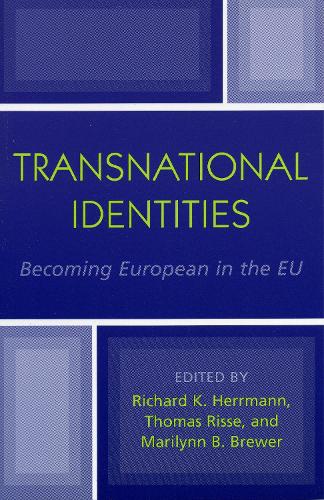
Transnational Identities: Becoming European in the EU
(Paperback)
Publishing Details
Transnational Identities: Becoming European in the EU
By (Author) Richard K. Herrmann
Edited by Thomas Risse
Edited by Marilynn B. Brewer
Contributions by Glynis M. Breakwell
Contributions by Michael Brute
Contributions by Emanuele Castano
Contributions by Jack Citrin
Contributions by Brigid Laffan
Contributions by Ulrike Hanna Meinhof
Contributions by Jean Monnet
Bloomsbury Publishing PLC
Rowman & Littlefield Publishers
17th May 2004
United States
Classifications
General
Non Fiction
European history
306.2094
Physical Properties
Paperback
320
Width 136mm, Height 204mm, Spine 17mm
417g
Description
This original work explores the increasingly important phenomenon of the formation of transnational identity. Considering the ongoing relevance of the European Union, the contributors ask a series of intriguing questions: Is a European identity possible How are the various types of European identity formed and maintained How are these identities linked to the process of European integration Examining the psychological, institutional, and political mechanisms that encourage or impede identification with transnational groups, the book considers these theoretical questions in light of new evidence drawn from a rich body of primary research, including field experiments, in-depth interviews with elites, and public opinion surveys. Brought together for the first time, social psychologists, sociologists, political scientists, and ethnographers share their theoretical and methodological perspectives in tackling the common issues surrounding the emergence of 'European' as a political identity. Paying special attention to the role of the institutions of the EU, the authors investigate the impact of neo-functionalist strategies and find that the processes of identity formation are far more complicated than can be explained by material and institutional factors alone. The authors engage in a fruitful dialogue about how much a European identity exists and how much it matters as they delve into the sources of disagreement and their implications.
Reviews
A welcomeand timelycontribution. Theoretically innovative and empirically rich case studies document the complex, uneven, and often surprising ways in which European identities areor are notchanging. Transnational Identities will find a wide and appreciative audience among students of identity, Europeanists, and social scientists of various methodological orientations. -- Jeffrey T. Checkel, University of Oslo
Works like Transnational Identities go along way toward developing a pool of evidence which social scientist can examine and consider now, while future historians of late-twentieth century Europe will be able to explore for many years to come. This is an important and useful work for any scholars in the social sciences studying identity formation. -- Andrew D. Devenney, Central Michigan University * H-Net: Humanities and Social Science Reviews Online *
The book proves to be an insightful reading and makes a remarkable contribution to the academic debates on European political identity and European democratic governance. * Global and European Law Books Review Program *
This imaginative, multidisciplinary volume probes Europe's transnational identities by bringing together the work of political scientists, social psychologists, ethnographers, historians, and linguists. Differences in approach and findings convey a complex and nuanced understanding of central issues in European politics. Teachers and students interested in the evolving European polity will want to read this impressive collection. -- Peter J. Katzenstein, Cornell University
Author Bio
Richard K. Herrmann is professor in the Department of Political Science and director of the Mershon Center, Ohio State University. Thomas Risse is professor in the Department of Political and Social Sciences and director of the Center for Transatlantic Foreign and Security Policy, Freie UniversitSt Berlin. Marilynn B. Brewer is professor in the Department of Psychology, Ohio State University.
